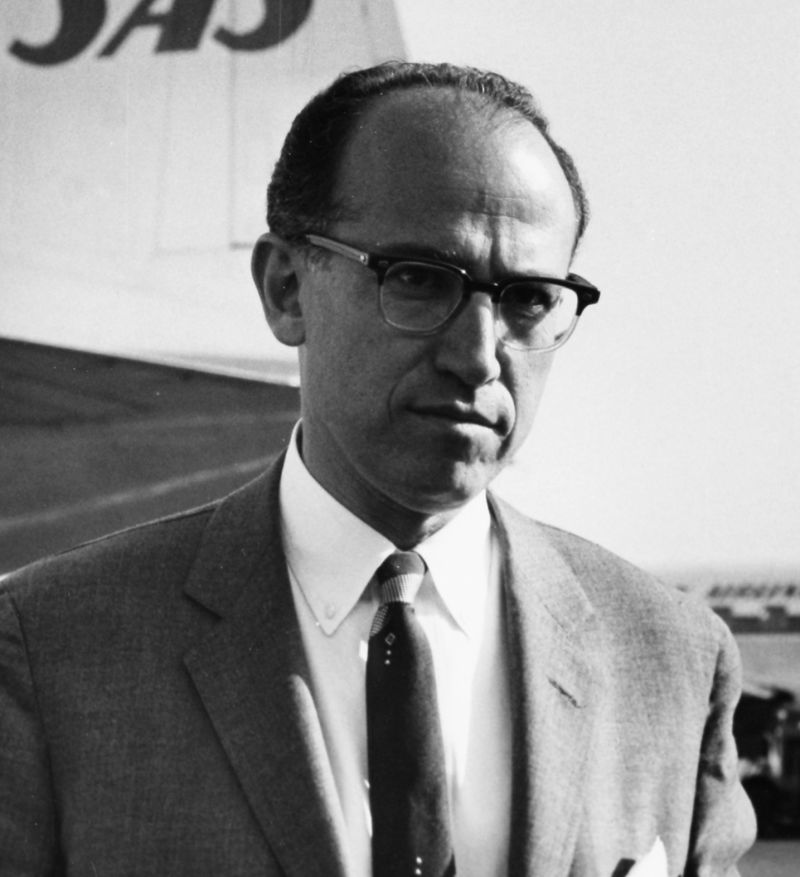Yet, for all the good Salk did, he became an object of scorn among his fellow scientists before and after he developed the vaccine. Researchers had all been in “lockstep” in their desire to create a live viral vaccine, Jacobs said, in keeping with the preventives for smallpox, rabies and yellow fever. “Jonas Salk actually thought you could kill a virus, still retain its immunity, and have a much safer kind of vaccine,” Jacobs said. For this, the committee of scientists involved in the polio effort demeaned him, and Salk created and tested the initial vaccine in secret, “while the committee was still arguing about the proper approach.”
Children received the first polio vaccine in 1954, and Salk received a Congressional Gold Medal in 1955. His celebrity grew. "He couldn’t walk into a hotel or a restaurant without causing a stir like a movie star,” Jacobs said.
Salk obliged the public with appearances unusual for a scientist, going on TV to demonstrate how to make a vaccine in a blender and giving interviews to mass market magazines like Good Housekeeping. "That was really outside the proper academic decorum, and the scientific community certainly rebuked him for that behavior."
Jacobs said Salk’s relative youth also hurt his reputation with colleagues. In addition, they thought he had grabbed the limelight to the exclusion of giving credit to other researchers who had participated in the vaccine effort. But that wasn't his fault, Jacobs said. "He was the media’s darling and the public’s darling. He tried to mention other scientists, but he had become the icon for polio.
"They really ostracized him a bit for that."
A Scientific Feud
Jacobs said Salk wrote rambling scientific papers “full of metaphors,” in a manner not in keeping with scientific academia. Salk was, remarkably, denied entry into the National Academy of Sciences. “It was very easy to be blackballed,” the author said. Several scientists told Jacobs they thought Albert Sabin, who developed an oral form of the polio vaccine, was behind Salk’s exclusion. “He said anyone can go into the kitchen and do what Salk did,” said Jacobs. Other scientists agreed Salk's breakthrough wasn’t “a basic scientific discovery. It wasn’t really prizeworthy.”
While Salk and Sabin were initially close, a feud developed. Sabin had tried to prevent Salk's vaccine from being tested in a national trial. After the U.S. replaced Salk's vaccine with Sabin’s in the early 60s, Salk worked furiously to reverse the decision. Sabin's vaccine used a live virus, and Salk was afraid that it would transform into a stronger form and actually cause polio. Some cases did surface, and today it's Salk's vaccine that is used in the U.S.
In the 1960s, Salk founded the Salk Institute For Biological Studies, with the goal of creating an ethos that combined the humanities with science. "There he was able to attract the most elite scholars from around the world, promising them lifetime funding and lifetime freedom to do their work," said Jacobs.
But again, Salk ran into trouble with the scientific establishment.
"It started with the name of the Salk Institute. Salk didn’t want that; he fought tooth and nail to not have it. But Basil OConnor (the first president of the March of Dimes) said, “I can’t raise money without your name. You don’t let me use that name, there’s no institute. “
Salk was a poor administrator, and the institute ran into financial troubles. Also hurting his reputation, Jacobs said: his outside interests and his writings.
“He did write a number of books on metabiology, (about) the place of man in the cosmos. Those books were not reviewed very well or accepted by the public , because he had a way of saying in multiple sentences what a normal scientist would say in two words. They were enot very accessible to the public in that regard.
"But many of his ideas were right on. His concern that with the thrill of scientific discovery, we’d make bigger and better ways to destroy ourselves, or that man was now his own greatest enemy, not the diseases that used to devastate communities."
For those views, Salk again attracted the antipathy of his colleagues. "Those at the Salk Institute behind his back called him The Prophet. …They eventually connived to shut down his laboratory because they felt his research on cancer and multiple sclerosis did not measure up. .... And finally a president of the institute was heard to say, 'I could raise more money with Jonas Salk dead than alive,’ and that gives you some idea of the feeling.”
In the 1980s, when Salk was in his 70s, he started researching AIDS, developing what he called a "therapeutic vaccine." Some trials looked promising, but the FDA didn't agree with his approach. He died in the midst of trying to get the agency to approve a trial.
Despite these setbacks, Salk's reputation remains intact. He never patented the polio vaccine, and in fact couldn’t, according to his agreement with the the National Foundation for Infantile Paralysis, which spearheaded the polio effort.
When asked if he owned the patent, Salk famously said, “How could you patent the sun?”
